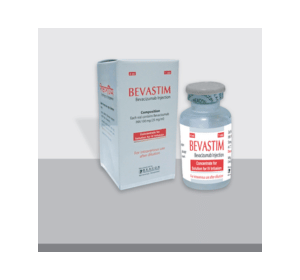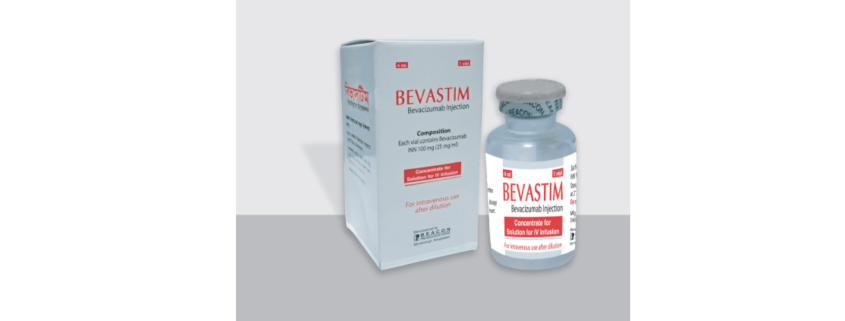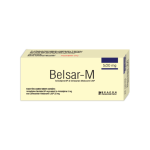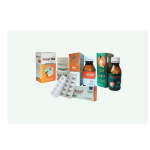Bevastim

Therapeutic Class:Monoclonal Antibody
Indications
Bevastim is a vascular endothelial growth factor-specific angiogenesis inhibitor indicated for the treatment of:
- Metastatic colorectal cancer, with intravenous 5-fluorouracil-based chemotherapy for first-or second-line treatment.
- Metastatic colorectal cancer, with fluoropyrimidine-irinotecan or fluoropyrimidine-oxaliplatin based chemotherapy for second-line treatment in patients who have progressed on a first-line Bevastim containing regimen.
- Non-squamous non-small cell lung cancer, with carboplatin and paclitaxel for first-line treatment of unresectable, locally advanced, recurrent or metastatic disease.
- Glioblastoma, as a single agent for adult patients with progressive disease following prior therapy. Effectiveness of Bevastim is based on improvement in objective response rate. No data available demonstrating improvement in disease-related symptoms or survival with Bevastim.
- Metastatic renal cell carcinoma with interferon alfa.
- Cervical cancer, in combination with paclitaxel and cisplatin or paclitaxel and topotecan in persistent, recurrent, or metastatic disease.
- Recurrent epithelial ovarian, fallopian tube, or primary peritoneal cancer that is: (1) Platinum-resistant in combination with paclitaxel, pegylated liposomal doxorubicin, or topotecan. (2) Platinum-sensitive in combination with carboplatin and paclitaxel or in combination with carboplatin and gemcitabine, followed by Bevastim as a single agent.
Limitation of Use: Bevastim is not indicated for adjuvant treatment of colon cancer.
Pharmacology
Bevacizumab is a recombinant humanized monoclonal IgG1 antibody that binds to and inhibits the biologic activity of human vascular endothelial growth factor (VEGF) in-vitro and in-vivo assay systems. Bevacizumab contains human framework regions and the complementarity-determining regions of a murine antibody that binds to VEGF. Bevacizumab has an approximate molecular weight of 149 kD. Bevacizumab is produced in a mammalian cell (Chinese Hamster Ovary) expression system in a nutrient medium containing the antibiotic gentamicin. Gentamicin is not detectable in the final product. Bevacizumab is a clear to slightly opalescent, colorless to pale brown, sterile, pH 6.2 solution for intravenous infusion.
Dosage
Patients should continue treatment until disease progression or unacceptable toxicity.
Metastatic Colorectal Cancer (mCRC): The recommended doses are 5 mg/kg or 10 mg/kg every 2 weeks when used in combination with intravenous 5-FU-based chemotherapy.
- Administer 5 mg/kg when used in combination with bolus-IFL.
- Administer 10 mg/kg when used in combination with FOLFOX4.
- Administer 5 mg/kg every 2 weeks or 7.5 mg/kg every 3 weeks when used in combination with a fluoropyrimidine-irinotecan or fluoropyrimidine-oxaliplatin based chemotherapy regimen in patients who have progressed on a first-line Bevacizumab-containing regimen.
Non-Squamous Non-Small Cell Lung Cancer: (NSNSCLC): The recommended dose is 15 mg/kg every 3 weeks in combination with carboplatin and paclitaxel.
Glioblastoma: The recommended dose is 10 mg/kg every 2 weeks.
Metastatic Renal Cell Carcinoma (mRCC): The recommended dose is 10 mg/kg every 2 weeks in combination with interferon alfa.
Cervical Cancer: The recommended dose of Bevacizumab is 15 mg/kg every 3 weeks as an intravenous infusion administered in combination with one of the following chemotherapy regimens: paclitaxel and cisplatin, or paclitaxel and topotecan.
Platinum-Resistant Recurrent Epithelial Ovarian, Fallopian Tube or Primary Peritoneal Cancer: The recommended dose is 10mg/kg every 2 weeks in combination with one of the following intravenous chemotherapy regimens: paclitaxel, pegylated liposomal doxorubicin, or topotecan (weekly); or 15 mg/kg every 3 weeks in combination with topotecan (every 3 weeks).
Platinum-Sensitive Recurrent Epithelial Ovarian, Fallopian Tube, or Primary Peritoneal Cancer: The recommended dose is 15 mg/kg every 3 weeks when administered in combination with carboplatin and paclitaxel for 6 cycles and up to 8 cycles, followed by continued use of Bevacizumab 15 mg/kg every 3 weeks as a single agent until disease progression. Alternatively, 15 mg/kg every 3 weeks when administrated in combination with carboplatin and gemcitabine for 6 cycles and up to 10 cycles, followed by continued use of Bevacizumab 15 mg/kg every 3 weeks as a single agent until disease progression.



